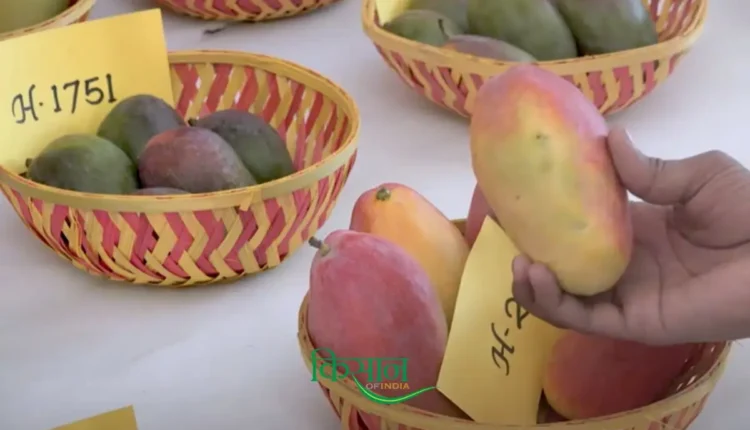Tribal farmers in Odisha have got an opportunity to improve agriculture and increase their income through post-harvest management of mango.
Kashipur is a tribal block located in Rayagada district of Odisha, where Central Horticultural Experiment Station (ICAR-IIHR), Bhubaneswar initiated Tribal Sub-Plan (TSP) project. Under this project, more than 450 tribal farmer families from 21 villages of 9 Gram Panchayats of Kashipur were covered.
The main livelihood of these tribal farmers was dependent on agricultural and forest products, and they cultivated only to meet the needs of their families. The area is rugged and sloping, making cultivation of annual crops very difficult and less profitable. In addition, repeated plowing of fields led to increased soil erosion, which was continuously reducing the fertility and production capacity of the land.
An important step begins with mango cultivation
Mango cultivation was considered an effective way to increase the income of tribal farmers. Seeing the potential of fruit cultivation, tribal farmers adopted new methods of mango-based farming with the help of the (Harpal) community. The Central Horticultural Experiment Station (ICAR-IIHR) implemented mango cultivation for tribal farmers with a holistic approach, which included the right production technology, post-harvest management of mango, skill improvement and effective marketing strategies. The beneficiaries were provided with necessary agricultural equipment and technical support, as well as training in scientific methods of production and post-harvest management.
Post-harvest management challenges faced by tribal farmers
Mango harvesting was an important task for tribal farmers, and it was mostly done by women. But these farmers had no knowledge about mango maturity, correct method of harvesting, grading, hot water treatment, packing and marketing. Due to this, there was a huge post-harvest loss (25-30%) of mango fruit, causing financial losses to farmers. There was a lack of several important techniques in post-harvest management of mango, which led to the loss.
Techniques of quality management
Some important techniques were used to increase the quality of mango and its marketing value. These included correct detection of mango maturity, use of mango harvesters, and transporting mangoes in plastic crates to maintain the quality of the fruit. In addition, grading was done on the basis of fruit size (Grade I, II and III).
Low-cost techniques like ethylene gas (etheral and caustic soda) were used to ripen the fruits. Mangoes were subjected to hot water treatment at 52°C for 10 minutes to protect them from anthracnose and fruit fly. Thereafter, the fruits were packed in a proper manner, which increased both their shelf life and marketing value. All these improvements made the post-harvest management of mango successful and benefited the tribal farmers.
Contribution of tribal women and marketing process
After these improvements, tribal women now started harvesting mangoes at the right time and with the stalk intact. They started packing the mangoes in plastic crates and transporting them to the collection point. With the help of Harpal Sangathan, fruits were collected from various villages, and women graded these fruits. These fruits were then treated with hot water and loaded into trucks to be sent to Bhubaneswar.
The Directorate of Horticulture, Government of Odisha also provided ripening chambers with ethylene gas to ripen the fruits. Finally, the fruits were sorted, packed in plastic crates and sent to the Bhubaneswar mandi. This entire process was carried out under Post-harvest management of mango, which improved the quality and marketable quantity of mango.
Increase in the income of tribal farmers
As a result of this change, the quality of mango and the marketable surplus of mango increased. Earlier, farmers who used to sell mangoes at Rs 10-12 per kg in the local market, now started selling better quality mangoes at Rs 20-25 per kg. Also, the marketing channel helped them supply 50-60 quintals of mango daily to the Bhubaneswar market. This process not only helped tribal farmers get good prices from their mango cultivation, but also reduced post-harvest losses from 25-30% to less than 10%. Post-harvest management of mango improved the economic condition for the farmers.
Transformative effect of mango farming in the lives of tribal farmers
These reforms significantly improved the economic condition of tribal farmers and made mango farming a profitable business. This step proved to be very effective in bringing smiles on the faces of resource-rich tribal farmers of Kashipur, Raigarh. Now people of the tribal community feel self-reliant and empowered. With the support of the Odisha government and the local society, mango farming not only increased their income but also improved their standard of living.
Effective methods of post-harvest management of mango introduced tribal farmers to modern agricultural techniques, which not only brought profit in their farming but also made them self-reliant and achieved sustainability in agriculture. Effective methods of post-harvest management of mango gave a new direction to tribal farmers, improving both their income and standard of living.
A new hope for the tribal community
Mango farming has become a ray of new hope, especially for tribal farmers. This project not only led to an increase in their income but also gave the tribal farmers an opportunity to understand how they can make the most of their farming. Now the tribal farmers see mango farming as a regular and profitable profession, and its effective management has improved their economic condition. Post-harvest management of mango has opened the way to a stable and prosperous future for the tribal community.
Contact details: If farmers want to share information or experiences related to farming with us, then they can do this by calling us on the phone number 9599273766 or by writing an email to kisanofindia.mail@gmail.com or by sending your recording. Through Kisan of India, we will convey your message to the people, because we believe that if the farmers are advanced then the country is happy.

